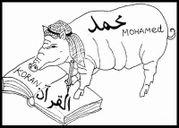 Tatiana Soskin |
|
The State Department spokesman last Thursday launched into a tirade of a sort that may be unique in the annals of U.S. diplomacy. Asked about a woman, Tatiana Soskin (also spelled Tatyana Suskin), who allegedly put up some posters in Hebron depicting the Prophet Muhammad as a pig, Nicholas Burns had this to say:
The United States has given great thought to this over the last couple of days, and I mean at the very highest levels of our government. We condemn the outrageous, crude and sick portrayal of the Prophet Mohammed by an Israeli settler the other day. This woman is either sick or she is evil.... We are very pleased that she is going to be put on trial by the Israeli Government. She deserves to be put on trial for these outrageous attacks on Islam. We are grateful that President Weizman and Prime Minister Netanyahu have denounced her and her actions and her sick cartoon in very clear terms.
This amazing statement for several reasons deserves a close look. First, by referring to the "very highest levels of our government," Mr. Burns is signalling that he is speaking for President Clinton. His comments are not one man's tirade but the considered and official response bearing the full authority of our leadership.
Second, the act that occasioned this fulmination was not a mass murder, nor even any sort of violent act, but the hanging of posters. I searched through weeks and weeks of State Department daily briefings and found nothing approaching this vituperative language in reference to the horrors that took place in Rwanda, where hundreds of thousands lost their lives. To the contrary, Mr. Burns was throughout cautious and diplomatic.
 The poster |
|
Third, the person who put up the posters engaged in what we in the United States would consider protected speech. Our government is supposed to endorse the right peaceably to distribute written materials, no matter how much it may execrate their contents. It is seems very strange that the State Department is "very pleased" that the alleged poster-distributor should be put on trial.
Fourth, Mr. Burns tried and convicted the woman accused of posting the cartoons - without waiting for her to enter a courtroom or go through a trial. Due process and the assumption of innocence, it appears, have disappeared along with free speech.
Fifth, other religious leaders get insulted all the time and no one even notices, and certainly not heads of state. To take two examples: Joseph Heller's novel God Knows (1984) has King David using dirty language to muse on his sexual conquests, while Martin Scorsese's movie The Last Temptation of Christ (1988) delves into Jesus' sexual longings. David and Jesus are fair game, but to quote the title of a book, "be careful with Muhammad!"
Finally, the outrage expressed at this press briefing fits into a larger context, what I call the "Rushdie rules." When Ayatollah Khomeini in February 1989 called for the murder of Salman Rushdie, a British subject, he opened a new era of censorship. With his death edict, he established that anyone who insults Islam, as he deemed Mr. Rushdie to have done in his magical-fantasy novel The Satanic Verses, puts his life on the line. True, Mr. Rushdie has survived the death sentence hurled at him from Tehran, but only by going underground and with lots of police protection. Mr. Khomeini successfully established that anyone seen as insulting Islam deserves to die.
And in fact, quite a few people, mostly Muslim, have since been killed. The most notorious incident took place in the Turkish town of Sivas, where a hotel housing a conference of militant secularists was torched in July 1993, killing thirty-seven. In Egypt the aged Egyptian Nobel Prize winner Naguib Mahfouz was stabbed in the neck and another writer, Farag Foda, was killed. And the list of victims goes on.
In addition to these actual acts of violence, the Rushdie rules have also had a powerful chilling effect on writers, Muslim and non-Muslim alike, dissuading them from parodying or blaspheming Islam - or even from writing a sober critical analysis of it. Why I Am Not a Muslim, a serious challenge to Islam published in Amherst, New York, in 1995, had to be produced pseudonymously, as the writer correctly feared for his life.
The Hebron incident shows that the Rushdie rules even apply in Israel, of all places. Jews there may with impunity say anything they like about their own religion, and they do, trading insults much worse than "pig"; but blaspheme Islam and they'll not only get hauled off to court but also assaulted by the full authority of the U.S. government.
This is wrong. The rules of free speech protect not nursery rhymes or paeans of goodwill but nasty, sacrilegious, and abhorrent discourse. For over two centuries, the U.S. government has consistently forwarded free speech, and did so against far more fearsome adversaries than fundamentalist Muslims. It must recover from Mr. Burns' very unfortunate rant and again and always stand up for this principle.
Dec. 1, 1997 update: I keep an eye on this story at "Following the Case of Tatiana Soskin."
Nov. 25, 2008 update: I look at similar cases to Soskin's at a weblog entry, "Israelis Insult Muslims, Face Criminal Charges."
